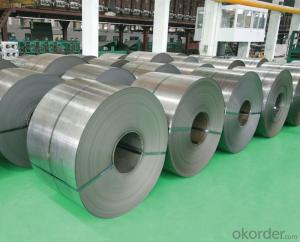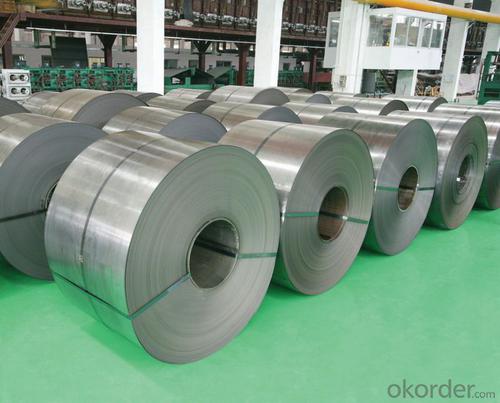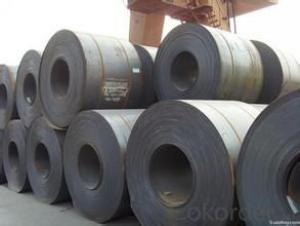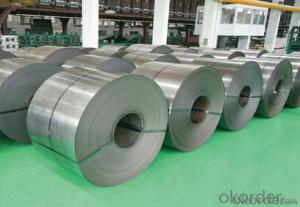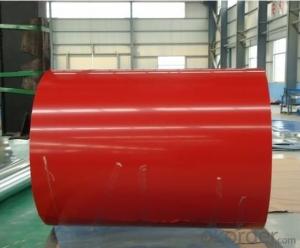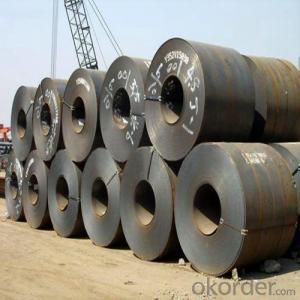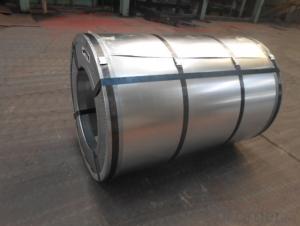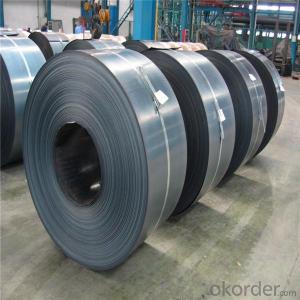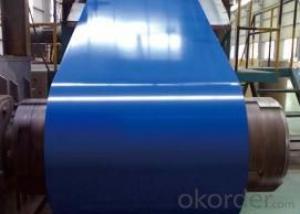COLD ROLLED STEEL COIL WITH HIGH QUALITY AND COMPETITVE PRICE NO.1
- Loading Port:
- Tianjin
- Payment Terms:
- TT OR LC
- Min Order Qty:
- 100 m.t.
- Supply Capability:
- 8000 m.t./month
OKorder Service Pledge
OKorder Financial Service
You Might Also Like
Cold rolled steel is the based material for galvanized steel coil and pre-painted galvanized steel coil. It is widely used in light industry for marking tank, furniture, refrigerators, washers, freezer plate, air conditioner, micro-wave oven, water heater, soot such machine etc.
Main specification:
COLD ROLLED STEEL | |
Thicknenss | 0.10mm-4.00mm |
Width | 600mm-2000mm |
Sheets length | 1200-6000mm |
Coil inner diameter | 508-610mm |
Surface treatement | matt finish/bright finish,oiling/dry, bright anneal/black anneal |
Coil weight | 3-5t |
We can supply customers' with different specifications of the highest quality and lowest price.
With excellent cold bending molded manufacturablity, good decoration effect, strong anti-corrosion ability, galvanized steel coils and sheets are also pollution-free and easily recycled. Accordingly, they can be used as final products and basic plates of color coated steel coils.
Sincerely welcome to contact us for the future details if any item interest you ,and we will make every effort to assure that your requirements will be satisfied ,and we hope to establish long-term business relations with you on the basis of the equality and mutual benefit.
We are waiting for your email.
- Q: How do steel coils contribute to the strength and durability of structures?
- Steel coils, being made of high-strength steel, contribute to the strength and durability of structures in multiple ways. Firstly, the tightly wound coils provide structural stability and support, enabling the construction of large-scale buildings and infrastructure. Additionally, the inherent strength of steel allows it to withstand heavy loads, impacts, and extreme weather conditions, ensuring long-lasting durability. Furthermore, steel coils offer excellent resistance against corrosion and fire, further enhancing the structural integrity and lifespan of the structures they are used in.
- Q: How are steel coils used in the production of agricultural structures?
- Due to their exceptional strength and durability, steel coils find extensive use in the production of agricultural structures. These coils, typically composed of high-quality steel, have various applications within the agricultural industry. One major application of steel coils in agricultural structures involves the construction of buildings and storage facilities. By using steel coils, farmers can create robust frameworks that support the walls and roofs of these structures. The inherent strength of steel allows for the construction of spacious areas without the need for excessive support columns, providing farmers with ample storage space for their crops, machinery, and livestock. Furthermore, steel coils play a crucial role in the manufacturing of agricultural equipment and machinery. Whether it be tractors, plows, harvesters, or irrigation systems, steel coils are essential in the fabrication of these tools. The high tensile strength of steel ensures that these agricultural machines can endure the rigorous conditions of farming, including heavy loads, rough terrains, and exposure to harsh weather elements. Moreover, steel coils are also indispensable in the production of fencing and enclosures for agricultural purposes. Whether it's safeguarding crops from animals or establishing boundaries for livestock, steel coils are a vital component in constructing robust and reliable fences. The strength of steel guarantees that these fences can withstand the pressure from animals, preventing them from breaking through and causing harm to the crops or escaping. In conclusion, steel coils are a vital component in the production of agricultural structures and equipment. Their strength, durability, and versatility make them an ideal material for constructing buildings, manufacturing machinery, and creating fences in the agricultural industry.
- Q: How do steel coils contribute to the HVAC ductwork industry?
- Steel coils play a crucial role in the HVAC ductwork industry by providing the necessary material for the fabrication of ducts. These coils, typically made from galvanized steel, offer several key contributions to the industry. Firstly, steel coils are highly durable and long-lasting, making them ideal for constructing HVAC ductwork. They can withstand high temperatures, pressure, and exposure to various environmental elements. This durability ensures that the ducts made from steel coils can efficiently transport air for extended periods without deteriorating or losing their structural integrity. Moreover, steel coils are flexible and malleable, allowing for easy manipulation during the fabrication process. HVAC ductwork often requires customization to fit specific building layouts and designs. Steel coils can be easily cut, bent, and shaped without compromising their strength. This flexibility enables the production of ducts in various sizes, shapes, and configurations to meet the specific requirements of different HVAC systems. Additionally, steel coils provide excellent resistance to corrosion and fire. The galvanized coating on the steel surface acts as a protective layer, preventing rust and corrosion caused by moisture or chemical reactions. This corrosion resistance ensures that the ductwork remains functional and safe for an extended period. Furthermore, steel coils contribute to the HVAC ductwork industry by enhancing energy efficiency. The smooth surface of steel coils reduces air friction and turbulence within the ducts, allowing for smoother airflow and reducing energy loss. This improved energy efficiency translates into cost savings for building owners and occupants, as it reduces the energy consumption required to maintain a comfortable indoor environment. Lastly, steel coils are readily available and cost-effective, making them a popular choice for HVAC ductwork fabrication. The abundance of steel coils in the market ensures a steady supply, allowing for efficient production and installation of ductwork systems. Furthermore, their cost-effectiveness makes them an economical option for both small and large-scale HVAC projects. In conclusion, steel coils contribute significantly to the HVAC ductwork industry by providing a durable, flexible, corrosion-resistant, energy-efficient, and cost-effective material for the fabrication of ducts. Their unique properties ensure the construction of high-quality ductwork systems that effectively and efficiently distribute air in buildings for optimal comfort and functionality.
- Q: What is the difference between galvanized and galvalume steel coils?
- Both galvanized and galvalume steel coils have undergone a coating process to enhance their durability and resistance to corrosion. However, there are distinct differences between the two. Galvanized steel coils have a layer of zinc coating, which provides excellent corrosion resistance and protects the underlying steel from rust and other forms of deterioration. The zinc coating also acts as a barrier against moisture and prevents direct contact between the steel and the elements. Galvanized steel coils are commonly used in construction, automotive manufacturing, and agricultural equipment, where corrosion resistance is crucial. On the other hand, galvalume steel coils are coated with a combination of zinc and aluminum. This unique coating composition offers enhanced corrosion resistance compared to galvanized steel coils. The aluminum in the coating acts as a sacrificial anode, providing additional protection to the steel by sacrificially corroding instead. This sacrificial protection mechanism helps the underlying steel remain intact and prevents the spread of corrosion even if the coating is damaged. Galvalume steel coils are often used in environments with extreme weather conditions and high humidity, making them suitable for roofing, siding, and other outdoor applications. To summarize, the main difference between galvanized and galvalume steel coils lies in the composition of their coatings. Galvanized steel has a zinc coating, while galvalume steel has a combination of zinc and aluminum. Galvalume steel offers superior corrosion resistance due to the sacrificial protection provided by the aluminum in the coating. The choice between the two depends on the specific application and the level of corrosion resistance required.
- Q: How are steel coils used in the manufacturing of engine components?
- Steel coils are used in the manufacturing of engine components as they provide strength and durability. They are typically processed and shaped into various parts such as connecting rods, crankshafts, and camshafts, which are essential for the engine's functionality. The coils are formed, machined, and heat-treated to meet the precise specifications required for each component, ensuring optimal performance and reliability in engines.
- Q: If you combine stainless steel with gold, does that make stainless gold?
- Nope, Stainless Steel is a tradename for a certain alloy. Regular Steel, which is formed from Ferrous Oxide (via the Bessimer Process). The stainless part is because they mixed in some other compound to give it unique qualities. Gold, on the other hand, is a pure element, and it can form alloys with other metals, but there are no guarantees what the properties will be
- Q: I got a muzzy carp point arrow and its head is steel with 1.7% carbon, its used in the water. Will i have to dry it after every use or is it stainless. Thanks
- stainless steel also rusts it just takes longer to. what you have is just a higher grade of steel, which isn't stainless anyways so yeah wipe it clean when you're done.
- Q: How are steel coils labeled for identification?
- Steel coils are typically labeled for identification using tags or stickers that contain important information such as the grade, size, weight, and production details of the coil. Additionally, some coils may also have unique identification numbers or barcodes for easier tracking and inventory management.
- Q: For my homework we have to fill out a table, but I cannot find some basic uses of these types of steel anywhere:Low carbon steel (iron mixed with lt;0.25% carbon)High carbon steel (iron mixed with lt;1.5% carbon)Stainless steel (iron mixed with nickle an chromium)Titanium steel (iron mixed with titanium)Manganese steel (iron mixed with manganese) Thanks :)
- Low okorder / You say you cannot find there uses anywhere. These all came up using the simplest of web searches. You really need to have a word with your IT teacher as clearly you are not doing basic searches properly.
- Q: What are the different types of steel coil grades?
- There are several different types of steel coil grades used in various industries and applications. Some of the most common steel coil grades include: 1. Carbon Steel: This is a basic type of steel that contains mostly iron and carbon. It is widely used in construction, automotive, and manufacturing industries due to its high strength and durability. 2. Stainless Steel: This type of steel contains chromium, which provides corrosion resistance and makes it suitable for applications that require resistance to oxidation and staining. It is commonly used in the food processing, chemical, and medical industries. 3. High-Strength Low-Alloy (HSLA) Steel: HSLA steel contains small amounts of alloying elements such as copper, phosphorus, niobium, and vanadium. This type of steel offers higher strength and better mechanical properties compared to carbon steel, making it suitable for structural applications. 4. Galvanized Steel: Galvanized steel is coated with a layer of zinc to protect it from corrosion. It is commonly used in outdoor applications, such as roofing, fencing, and automotive parts. 5. Electrical Steel: Also known as silicon steel, electrical steel has high magnetic permeability, low electrical conductivity, and low core loss. It is used in the production of transformers, motors, and other electrical equipment. 6. Tool Steel: Tool steel is a high-carbon steel that is specifically designed for making tools and dies. It has excellent hardness, wear resistance, and toughness, making it suitable for cutting, forming, and shaping materials. These are just a few examples of the different types of steel coil grades available. Each grade has its own unique properties and characteristics, making it suitable for specific applications in various industries.
Send your message to us
COLD ROLLED STEEL COIL WITH HIGH QUALITY AND COMPETITVE PRICE NO.1
- Loading Port:
- Tianjin
- Payment Terms:
- TT OR LC
- Min Order Qty:
- 100 m.t.
- Supply Capability:
- 8000 m.t./month
OKorder Service Pledge
OKorder Financial Service
Similar products
Hot products
Hot Searches
Related keywords
